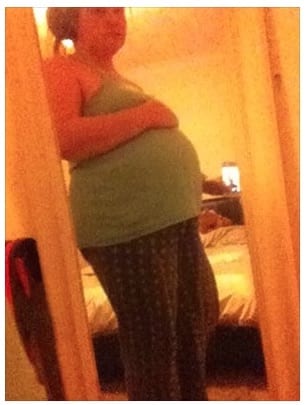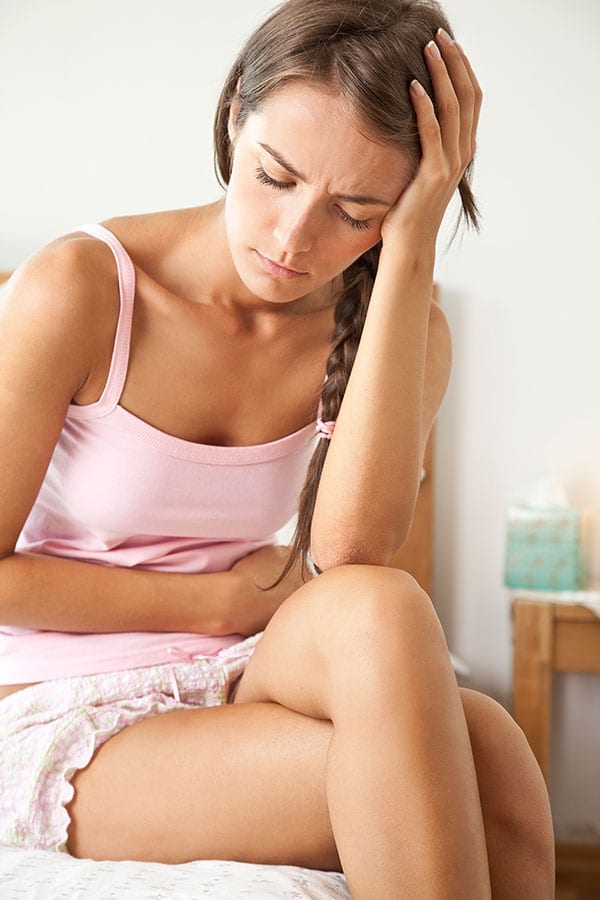
Are you sometimes so bloated that you feel like you are pregnant? Or even had people ask you if you are pregnant? Do you have an extra set of clothes set aside for those times when you are so bloated that it’s time for a wardrobe switch? Maybe you are like Samantha, a woman just trying to deal with this painfully inconvenient, embarrassing physical disruption, along with all of the other frustrating and painful effects of Endometriosis.
We met Samantha in a forum recently, and she agreed to share her story and photo. She says: “I now only go out to doctors/hospitals or dentist as I cannot cope with people thinking and staring at me thinking I am pregnant. Every doctor blames the bloating on something else, but no one has investigated or tried to do anything about it. I would be so grateful for any help, as I feel totally alone.”
The severe bloating that goes hand-in-hand with endometriosis is too often dismissed by doctors as a minor symptom. For the patient, however, this symptom can be emotionally and physically devastating.
Endo Belly is also an example of the wide array of symptoms endometriosis patients experience and one of the very common misunderstandings about this disease. Physicians, patients, and even endometriosis specialists often misunderstand the root cause of many “endo symptoms”. Are they always a result of endo, or could there be other causes?
Good progress has been made on increasing awareness of endometriosis and optimal treatment. Proper surgical treatment of endometriosis requires wide excision of the endometriotic implants rather than just burning or cautery. Surgery that simply burns the surface of the implants leaving underlying disease behind is often associated with either continued symptoms or recurrence of symptoms soon after surgery.
This is not the full story, however, and to truly understand this condition, we need to raise awareness of the missing pieces in the puzzle. In my 25 years of practice specializing in endometriosis, I have come to appreciate the complexity of the pattern of symptoms many of my patients deal with. While approximately half of my patients are primarily affected by endometriosis, which is effectively resolved by excision surgery, the other half have other conditions or health problems that co-exist with their endometriosis. In this latter group of patients, while excision surgery provides the foundation of their treatment, complete resolution of their symptoms requires that we address additional health problems, including multi-systemic dysfunction. In these patients, it is a mistake to automatically assume that continued symptoms after surgery are due to persistent or recurrent endometriosis. The real problem may well extend beyond this diagnosis and often encapsulates other often-related health conditions that may masquerade or be overshadowed by the initial diagnosis of endometriosis.
“Endo Belly” can be the result of endometriosis implants and may get better after surgical removal of the disease. Endometriosis implants, however, are not the only cause of “Endo Belly”.
One such example is the infamous “Endo Belly”. While “Endo Belly” can be the result of endometriotic implants, and may resolve after complete excision of all endometriosis, this is certainly not always the case and other health problems can also cause or contribute to those all-too-familiar flares of extreme bloating and distention. At our center, we therefore approach endometriosis and its associated health problems from a multi-disciplinary paradigm including traditional medicine (e.g., excision surgery), as well as a variety of integrative and holistic modalities.
Our approach is based upon the most recent scientific information. We treat the whole patient, not simply surgical removal of the endometriosis implants. One example of this is the role of the bowel, including the human microbiome (the bacteria that live in our bowel), in causing pelvic pain and other health problems. We will discuss below the importance of gut bacteria as a contributing causal factor in bloating and “Endo Belly”. This is a very brief overview and covers just a few of the important facts about the critical impact of our intestinal health on our overall health.
Best wishes,
Dr. Andrew Cook
Gut Bacteria & Endo Belly – Why You Look & Feel So Bloated
What does your gut bacteria have to do with that annoying bloating and gastrointestinal discomfort? A lot!
We have more bacteria living in our guts than we do human cells in our body. We have a balance of beneficial (commensal) bacteria and potentially pathogenic bacteria (disease-causing unfriendly bacteria). This is actually one of the most complex ecosystems in nature. It is important to maintain a healthy balance of bacteria in the gut.
These beneficial bacteria are not simply along for the ride, but rather, they play a critical role in our health. For example, they are involved in digesting food that we eat, producing vitamins such as vitamin K2 and biotin, converting thyroid hormone into its active form, detoxification, reducing inflammation, reducing pathogenic forms of bacteria, and energy production. These are only a few of their important jobs! We also have yeasts and viruses in our guts. It’s important to keep a healthy balance of these microorganisms in our guts too.
Gastrointestinal problems can be a result of bacterial problems in the small and/or large bowel. Most of the bacteria are in the large bowel. A little is in the small bowel, but not nearly as much as in the large bowel. Dysbiosis is a condition where an imbalance in beneficial and potentially disease producing pathogenic bacteria occur in the bowel. SIBO (Small Bowel Intestinal Overgrowth) is a condition where the bacteria from the large bowel migrate up into the small bowel. With SIBO, the disease-producing of bacteria in the wrong location is exposed to undigested food, which it eats and turns into a large amount of gas (bloating, pain, indigestion).
Factors that may negatively alter the sensitive bacterial balance lead to dysbiosis or SIBO and include:
- Antibiotics (with certain antibiotics it can take up to 2 years to regain a healthy microbial balance in your gut)
- Chronic stress
- Non-steroidal anti-inflammatories (NSAIDS)
- Constipation
- Standard American Diet (SAD diet – high in unhealthy fats, processed carbohydrates, and sugar and low in fiber and vegetables)
- Food allergies and Sensitivities
- A weakened immune system
- Intestinal infections (such as yeast overgrowth) and parasites
- Inflammation
- Poor function or removal of the ileocecal valve (valve between the small and large intestine)
There are several common symptoms of dysbiosis and SIBO. You may be experiencing several of them. They include :
- Bloating, belching, burning, flatulence after eating
- A sense of fullness after eating
- Indigestion, diarrhea, constipation
- Systemic reactions after eating (such as headaches and joint pain)
- Nausea or diarrhea after taking supplements (especially multivitamins and B vitamins)
- Weak or cracked finger nails
- Dilated capillaries in the cheeks and nose (in a non-alcoholic)
- Iron deficiency
- Chronic intestinal infections, parasites, yeast, unfriendly bacteria
- Undigested food in stools
- Greasy stools
- Skin that bruises easily
- Fatigue
- Amenorrhea (absence of menstruation)
- Chronic vaginitis (vaginal irritation)
- Pelvic pain
Dysbiosis is not uncommon in women with endo. Endometriosis-associated intestinal inflammation may alter the balance of gut microflora.[i] Balley and Coe investigated the intestinal microflora in female rhesu monkeys and found an increased amount of intestinal inflammation and fewer aerobic lactobacilli and gram negative bacteria in monkeys with endometriosis compared to those without the disease. A disruption in the gut microflora (dysbiosis) can have negative health consequences including poor digestion, malabsorption of nutrients, increased inflammation, and increased gastrointestinal infections.[ii] Intestinal microflora act as a barrier to gut pathogens by blocking attachment to the gut-binding site and produce antibacterial substances.
Problems with an overgrowth of bacteria in the small bowel can also result in the common gastrointestinal complaints among women with endometriosis. Recent studies have demonstrated the presence of Small Intestinal Bacterial Overgrowth (SIBO) in women with endometriosis.
In one study, 40 out of 50 women with laparoscopic confirmed endometriosis were found to have SIBO. [iii] SIBO needs to be considered as a contributing factor anytime a woman has severe bloating.
The gut also plays an important role in estrogen elimination. Phase II detoxification in the liver (medical term for the process of eliminating many hormones including estrogen) utilizes conjugation of estrogen to other compounds so they can be excreted in bile.[iv] If the gut flora is unbalanced, certain bacteria secrete an enzyme called beta-glucuronidase, which cleaves the glucuronide molecule from estrogen, allowing estrogen to be reabsorbed into circulation vs excreted in the stool. Lactobacillus, a healthy bacteria, decreases the activity of B-glucoronidase.[v] If the activity of B-glucoronidase is increased, more estrogen will be reabsorbed and potentially worsen the endometriosis.
Do you have any of these symptoms? If you do, they may be caused by more than your endo inflammation. If you have these symptoms after good quality endometriosis excisional surgery, your endometriosis is gone, but your symptoms may be a result of other conditions such as the ones discussed above. Some tests that may be performed include a hydrogen/methane breath test, a comprehensive stool study through a lab such as Genova Diagnostics, organic acid testing, and food sensitivity testing. There may also be therapeutic diets that can be helpful for symptom management such as the Specific Carbohydrate diet, the FODMAP diet, the Microbiome Diet, and the Autoimmune Paleo Diet. There is no one size fits all treatment for dysbiosis. Some diets that help with dysbiosis can make SIBO worse. A qualified practitioner can help to determine what studies and treatment may be helpful. Some of the lab tests which may be relevant are included in our Specialized Lab Testing at Vital Health Endometriosis Center.
You may be interested in this video : Enterome: the gut microbiome and it’s impact on our health:
Wishing you a happy and healthy day,
The Vital Health Team
Vital Health Endometriosis Center continues to provide the most comprehensive approach to the diagnosis and treatment of endometriosis.
Visit Our Resource Center to Learn More About Endometriosis
Read & Share What it Really Means to Have Endometriosis
[i]. Balley M, Coe C. Endometriosis is associated with an altered profile of intestinal microflora in female rhesus monkeys. Human Reproduction. 2002;17(7):1704-1708.[ii]. Miniello V, et al. Gut microbiota biomodulators, when the stork comes by the scalpel. Clin Chim Acta. 2015. Web. Accessed February 25, 2015.[iii]. Mathias JR, Franklin R, Quast DC, et al. Relation of endometriosis and neuromuscular disease of gastrointestinal tract: new insights. Fertil Steril. 1998; 70:81-88.[iv]. Evans, J. An integrative approach to fibroids, endometriosis, and breast cancer prevention. Integrative Medicine. 2008; 7(5):28-31.[v]. Goldin BR, Gorbach SL. The effect of milk and lactobacillus feeding on human intestinal bacterial enzyme activity. Amer J Clin Nutr. 1984;39(5):756-61.






Unfortunately you are not alone I’m suffering with endo belly too and repeatedly get asked if I’m pregnant or when am I due. Even the nurse at A+E felt around looking for an imaginary baby when I had chronic pelvic pain.
I also have problems with my bowel and pelvic organ prolapse all stemming from years of Endo, adhesions and scarring post surgeries.
I’m glad of this research at least it’s giving us an answer why it’s happening to us
Omg I swear why is this happing I look pregnant but I’m not this Endo messing up my life
I have had endo-belly as well. I began receiving a Zolodex implant 3 months ago. The implant puts your body in a chemical menopause. This doesn’t work for everyone, but it has been a lifesaver for me. No endo-belly or pain!
This is incredible information..I just wish I would have seen it 2.5 years ago. If I had, I could have saved myself from cdiff (and a subsequent FMT to finally get rid of it), SIBO, and an earlier diagnosis of endometriosis. The trouble with endo symptoms (at least in my case) is that they mostly presented themselves as GI issues, so I was caught trying to solve all the GI issues (try this, eat that, don’t do this, don’t eat that) when in truth it was endo all along.
FINALLY, one smart gyno dr put it all together and said despite no evidence on repeated ultrasounds, MRIs, cat scans, and physical exams he said it was time for a laparoscopy so he could get some “eyes” in there. As it turns it, it was one of the worst cases of left side endo he’d ever seen in 30 years and nearly closed off my ureter (which would have caused kidney failure).
My amazing gyno now uses a video of my surgery as well as all of my seemingly unrelated symptoms as a case study in talks he gives around the country. His message…listen and believe your patients, even when the machines don’t show anything.
I’m grateful beyond words, and I am now on a personal mission to spread the word about endo. I’ve already helped two people get an endo diagnosis which led to surgeries for both. Please continue your great work – we need as many people as possible to reach out!
Hi Julie, Who’s your gyn that operated on you? I have a lot of these symptoms & I’ve finally met a gyn that suspects I have this awful disease. But cos of my age, 38 & low fertility I’ve to have IVF to help me get pregnant soon before any surgery required. As time is running out for us to have a baby. I live in the UK.
Could you please share your doctor’s info? Thank you
Please share which your Dr is. I've suffered fo 20 + years. I was part of the "it's all in your head" era and before the internet existed. 7+ years ago I had a hysterectomy. Before that "cure" was considered a myth. I'm back to an endobelly (just learned that is what it's called now) yesterday my PCP felt all he could offer was psychotherapy as he believes that is the cause. I swear if one more insensitive male Dr tells me that…smh. No imaging. Nothing. I found, by accident, bowel endometriosis. I never had deep excision only ablation as that was the standard then. The scar tissue is astonding. I need to find a Dr that specializes in stage 4 endometriosis post hysterectomy and get this done right. Preferably in the south centered around Mobile, Alabama. I lostt my ability to have more children because I believed that was the only way to end it. I was wrong. So please anyone reading this…email me your recommendations. I can't even talk to another and yet again explain my story without crying. I guess he also thought crying meant therapy is needed. Endo causes so much loss, it deserves a tear or 2. Email me at superscully26@gmail.com.
When I saw the picture of Samantha, I started to cry! There was finally proof that this was not all in my head and that I am not alone in struggling with this. I began having symptoms about 2 years ago. Despite being an avid ballroom dancer, yoga student and gym rat, I developed the endo belly. I tried so many diets and worked out even harder to try to curb this weight gain in my tummy to no avail. People are constantly asking me if I am pregnant and it makes me feel like a failure as I have tried everything to get rid of it. Only within the last 3 months have I discovered that I have adenomyosis and endometriosis which is now affecting my sciatic nerve in my left leg. I walk with a limp now and during that time of the month, I can barely walk at all! In two years I have gone from being a vibrant, healthy woman to hanging out at my house too embarrassed to go out because I hate when people ask me when I am I due.
I don’t know if there are any solutions for me. I am certainly going to try to find them but just knowing that I am not alone gives me great encouragement and motivates me to keep trying to find answers.
Hello my Endo Sisters! You are not alone. I’ve had an endo belly for months now and I tried to change my diet, exercise more, watch what I eat, eat healthier snacks, but nothing works. I’m so glad to have come across this site. Even though I hate that you all are going through this, I feel relieved that I’m not alone. I get tired of complaining to my husband about my Endometriosis symptoms. I’ve had it for way over a decade and its always causing some kind of problems. I do know it is a disease we could never escape but geez, we need more gynecologists out there to be more passionate, do more case studies and research this ugly disease more. It is debilitating! I look like I’m at least 7 months pregnant. I’m so uncomfortable and I’m feeling fatigue all the time. Most of the time, I don’t even have an appetite due to the fullness I feel each day. Pains in my left side and joint pain mostly when I get out of bed in the morning. I’m very surprised this disease is not on the Disability List because it is difficult to work/function on a daily basis. Even after countless laparoscopies, nothing has helped. I guess it is time to make yet another appointment to avoid kidney or further GI damage. I feel terrible for all of us that is going through this and especially those with a gyno that just acts as if your symptoms are minor or blown off. Thank you for spreading the word. That is so important to all of us that are constantly suffering.
I have suffered from endometriosis for years now. I have the worst endo belly that has changed my quality of life. I am having surgery tomorrow again but I am hopeful that this gyn knows what she is doing. It’s sad that this disease is not spoken of as other diseases. I wish that there could be more studies and a cure.
I began crying last night when I found this article and started reading everybody’s experience. I’ve been suffering with this since March I’m 35 my quality is life has changed dramatically. I have been to numerous doctors and I found one who is a PA and I looked at her the first day I met her and I said you have to help me because nobody else is !!she spent time with me she did extensive testing in my pelvic area and we’re having a lapascopy done in November, my ultrasounds come back fine no cyst, paps normal this Dr is thinking it has to be endometriosis because on testing it doesn’t not show. I remain active everyday however I don’t feel comfortable in my own skin I feel like I’m pregnant I feel like I can’t breathe it times because my stomach so large. I look at pictures of myself from last summer and how my stomach used to be and I just know this isn’t normal I’m still puzzled by all of this and I just want to go back to how it used to be. I am really struggling emotionally mentally physically and I’m also scared that what if this doctor doing the surgery doesn’t know what they’re doing in November. I’m trying to get into my PCP again just to see if she’ll order a sonogram of my stomach just to make sure there’s nothing else going on because whenever you say endometriosis to somebody they just think you had bad cramps they have no idea how that other symptoms like this can occur. I want to thank everybody for sharing parts of their story it helps me opened up and it let me know that I’m not alone
Jennifer I hope this finds you well and having found relief from your Endo. I am also in PA and am searching for a doctor to help my daughter. Could you share who your doctor is?
I’m also having endometriosis and my life is so ruined. My body is constantly changing. Sometimes the dress I wear in the morning can’t wear in the evening. Unbelievably my belly get bloted. I look like pregnant. I’m so very tired of this.
Curious for an opinion. I had an excision with a specialist, I had no pain relief and no relief from bloating. I also have celiac (diagnosed with biopsy) and am 100% gluten free. I have worked with naturopaths, holistic nutritionists, and GI specialists for years. I’ve done the FODMAPS, SCD, and paleo diets, for long periods of time with no symptom relief. I was negative for the SIBO test, and 2 rounds of natural antibiotics and one of real antibiotics to treat SIBO did nothing.
I had a small bowel follow through and have low motility (likely from damage from celiac, even though I am 6 years of following the diet strictly. I was scheduled for another upper endoscopy when I became pregnant (after a very long time). So it is postponed.
No one knows what to do with me. Have you come across cases like this?
ive had endo since i was 15, i’ve just turned 40. No doctor or gyn has a clue what to do with me, no period in over 20 years either. I have endo belly, look like im 8 months pregnant and have for years. Done diets, detox, personal trainer and just now accept the fact this is me and it cant be helped.
I would like to inquire about the second surgery options. I am 28 i have stage 4 endo i had a laproscopy 2 years ago. My endo is now back and my ovary is now attached to my bowels.
Can u imagine if men had endo? a) millions would b poured into research to find a cure, b) tv & radio shows would regularly feature items on this chronic condition and how it can be improved and c) male endo-sufferers would get mandatory fatigue-leave from work whenever they needed it – just sayin. And I’m writing this from my bed, my hot water bottle on my bloated endo belly, too exhausted to face the day, yet comforted by the shared stories from my heroic endo sisters – we WILL get better!
Permalink
Permalink
Wow , I am so thankful for all of you …. I have come from being an athlete my whole life to this “I’m not leaving the house person “. I can’t work because my endo pain cripples me. My surgeon don’t want to do my next surgery because it’s too high risk as I am a stage 4 endo with extreme case. So I’m finding mentally very difficult to accept that this world of pain , endo belly , and some days chronic pain that has me crippled on the couch is now my life. People try to understand but you can see they don’t. People struggle to see me so inactive and think why it can’t be that bad. So ladies I hear you , I feel you and with a natural health background of 20plus years I’m determined to find some way to survive this horrific disease.